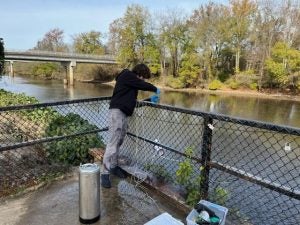Water Scholar Awardee Spring 2023: Daniel Reed
“PAH Contamination Variability in the Lower Tar River N.C. from a Legacy Hazardous Waste Site as a Function of Hydrological Conditions”
Daniel Reed grew up near the mountains in Hendersonville, NC where his family has an apple orchard farm. Being surrounded by nature and wildlife taught him to appreciate the environment, which ultimately led him to pursue a career in environmental science.
Within the Water Scholar Program, Reed is currently working on his project “PAH Contamination Variability in the Lower Tar River N.C. from a Legacy Hazardous Waste Site as a Function of Hydrological Conditions”. His research covers pollutants that go back decades ago.
“It really helps to have a little bit of a background before discussing my project,” Reed said. “Let’s imagine: 40-odd years ago, you are walking by a creek that’s going to be leading into the Tar River. You notice a gasoline smell and you get concerned. You shouldn’t just smell gasoline while walking along the creek, right? So, you decide to call the fire department. The Fire Department checks the site and finds out there is fuel asleep on the ground of the river.”
Reed said after the Fire Department prompted an investigation into the smell, the North Carolina Department of Environmental Quality declared the site an issue and remediation was done by Catlin.
However, he said, due to a Senate Bill, the remediation came to a stop. Today, Reed said, the site he describes still exists and is called Town Creek. He said it is located by the Tar River in Greenville, NC and the water still smells like burned tires.
“Something is clearly still going on there and it is affecting the Tar River,” Reed said. “Part of the reason why I started this project is that I knew there are signs of contamination from that 40-something years ago. Other people have done similar research before and found benzene, a gasoline molecule, around the waters I’m looking at. That’s good evidence that the pollution still exists.”
His goal is to use a different class of molecules, he said, called polycyclic aromatic hydrocarbons (PAH) to trace the contaminants in the water and around the river. He will look at a total of 45 PAH molecules, Reed said, which can be found in fuel, petroleum, and fire.
The sites he is looking at, he said, are nearby and at the contamination site, but not up the river itself. By researching different areas, Reed said, he wants to decrease the influence of potential fires.
“With the molecules detecting fire, it can become a little difficult because we live in a city and there are cars everywhere,” Reed said. “Where cars are, fires are close too. By moving a bit away from the actual site, I’m trying to minimize that fire influence, so I can just look for the molecules that come from fuel or petroleum.”
The project itself, he said, is part of his master’s program in Chemistry East Carolina University. One day his advisor, Sid Mitra, came up with the idea to look at a contaminated area in the Tar River, Reed said.
Once his advisor mentioned the idea to him, Reed said, he started getting interested in the project, as he knew the Tar River had fuel contamination which is known to have hazardous chemicals within it. He said that was when the project was “born”.
“Our site is not directly close enough to a well that somebody could be drinking the polluted water,” Reed said. “But that doesn’t mean people aren’t swimming in the area. Or go fishing there.”
The sampling he conducts comes from one-liter containers of water, he said, so he can extract the PAH molecules. Since a one-liter container is a rather large amount of water to be extracted at one time, Reed said, it is difficult to find laboratory glassware equipment that can fit all the liquid in it.
The largest container available at the laboratory at ECU, he said, was a one-liter container, which isn’t large enough to extract anything out of it. With the money he received from the Water Scholar Program, Reed said, he ordered funnel kits which are large enough to hold the extractions.

Daniel Reed taking water samples in Greenville, NC at the Tar River (Contributed picture).
“The bottles are comically large, but with them, I’m able to extract an entire liter of water at once to get the needed molecules in,” Reed said. “One might ask why I didn’t just use a smaller amount of water. What I’m looking for here is to trace molecules in very small amounts. I need to extract enough samples to notice those molecules and be able to detect them. With the larger funnels, I’m able to get more accurate data.”
So far, he said, he has done a lot of sampling of the upriver, downriver, and contamination sites. The water samples are now being reviewed in the laboratory, Reed said, and should soon be put together in data analysis.
Once the data analysis is done, Reed said, he will go on writing his master’s thesis about the research he conducted. He said it is his goal to graduate this upcoming July and start his Ph.D. at ECU in the fall.
“All I want to do is to keep doing environmental-related work,” Reed said. “It’s what engages me, it’s what I actually care about. I can’t explain why going out and picking up water from a river and analyzing the samples somehow entertain me. I simply enjoy it.”
For his future, Reed said, he can see himself being a professor and teaching at a university. He said his bachelor’s degree is in Science Education, which showed him how much he cares about teaching other people.
Moving back to his family in the mountains, Reed said, and teaching at the University of Asheville, would be a dream of his.
About Me
Name: Daniel Reed
Age: 23
College: Thomas Harriot College of Arts & Sciences
Bachelor of Science: Science Education
Classification/Focus: Master’s student in Chemistry
Hometown: Hendersonville, North Carolina
Bachelor of Science: Science Education
Dream job: Faculty Member
Future Plans
Fall 2023: P.h.D Candidate in the Integrated Coastal Sciences Program at ECU
